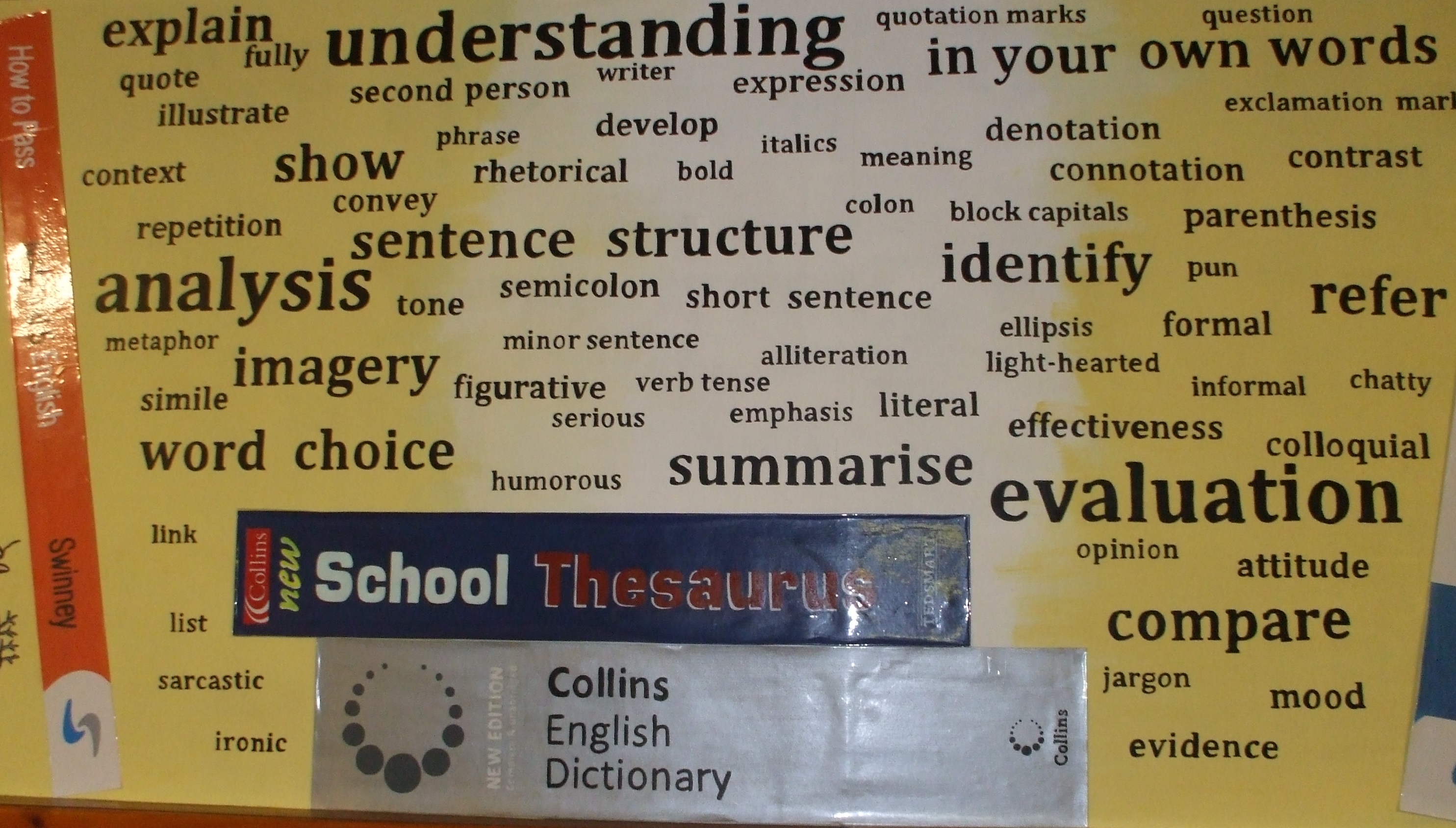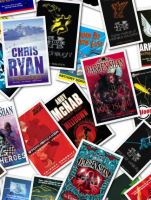Portfolio – Writing
The portfolio is worth 30 marks out of the total of 100 marks. This is 30% of the overall marks for the Course assessment. The course will be graded A – D.
The portfolio will contain two writing pieces worth a maximum of 15 marks each.
This assessment will assess the skills, knowledge and understanding specified for the project–dissertation in the Course Assessment Specification.
These are:
- writing in different genres for a range of purposes and audiences
The Added Value consists of challenge and application: the candidates will build on the skills they have acquired in the Creation and Production Unit and apply them with greater independence.
Candidates will produce two pieces of writing for two different purposes and audiences. The writing can be from any of the following types:
- persuasive
- informative
- argumentative
- personal/reflective
- poetry
- prose fiction
- drama
There is no requirement to write both creatively and discursively.
Each piece should be at least 1,000 words, with the exception of poetry which may be shorter.
The assessor will support the candidate to choose the focus, theme and genre for his/her writing.
This assessment has three stages:
- A planning stage which should be completed over a period of time.
- A development/research stage which should be completed over a period of time.
- A writing stage which should be completed over a period of time.
The length of the writing pieces should be appropriate to purpose and genre (poetry may be significantly shorter).
This assessment is likely to involve redrafting pieces of work.
There are no restrictions on the resources to which candidates may have access, for example, spellcheckers and dictionaries.
Candidates must undertake the assessment, whatever the nature, independently. However, reasonable assistance may be provided prior to the formal assessment process taking place. The term ‘reasonable assistance’ is used to try to balance the need for support with the need to avoid giving too much assistance.
Reasonable assistance may be given on a generic basis to a class or group of candidates, for example, advice on how to develop a dissertation plan. It may also be given to candidates on an individual basis. When assistance is given on a one-to-one basis in the context of something the candidate has already produced or demonstrated (e.g. detailed commentary on drafts) there is a danger that it becomes support for assessment and assessors need to be aware that this may be going beyond reasonable assistance.
Assessor comments on the selection of a task/topic is appropriate before the candidate starts the task.
Once work on the assessment has begun, the candidate should be working independently.
The writing stage will be conducted under some supervision and control. This means that although candidates may complete part of the work outwith the learning and teaching setting, assessors should put in place processes for monitoring progress and ensuring that the work is the candidate’s own and that plagiarism has not taken place.
Assessors should put in place mechanisms to authenticate candidate evidence. For example:
- regular checkpoint/progress meetings with candidates
- short spot-check personal interviews
- checklists which record activity/progress
Group work approaches, as part of the preparation for assessment, can be helpful to simulate real-life situations, share tasks and promote team working skills. However, group work is not appropriate once formal work on assessment has started.
General Marking Instructions
General Marking Principles for Advanced Higher English portfolio writing
- Marks for each candidate response must always be assigned in line with these General Marking Principles and the Detailed Marking Instructions for this assessment.
- Marking should always be positive. This means that, for each candidate response, marks are accumulated for the demonstration of relevant skills, knowledge and understanding: they are not deducted from a maximum on the basis of errors or omissions.
- Assessment should be holistic. There will be strengths and weaknesses in every piece of writing; assessment should focus as far as possible on the strengths, taking account of weaknesses only when they significantly detract from the overall performance. Marks should be awarded for the quality of the writing, and not deducted for errors or omissions. Writing does not have to be perfect to gain full marks.
Detailed Marking Instructions for Advanced Higher English portfolio writing
Consistent technical accuracy is a requirement for a mark of 8 or above. Consistent technical accuracy means that few errors will be present: paragraphs, sentences and punctuation will be accurate and organised so that the writing can be clearly and readily understood; and spelling errors should be infrequent.
As appropriate to genre, assessors should assess each piece of writing in terms of content, structure, stance/tone/mood and expression and arrive at a final mark.
© Scottish Qualifications Authority 2015
Other than poetry, where length should be appropriate to subject and form, each piece of creative writing should be at least 1000 words in length. You are required to indicate on the folio flyleaf the actual number of words used in each piece. You should also note that, although there is no prescribed maximum length, excessively lengthy pieces are usually self-penalising.
Always remember that to plagiarise is to cheat—and this could lead to your disqualification from any award. Markers are instructed to report all instances where plagiarism is suspected for further investigation (so be warned!).
The distinctive characteristics of the four specified forms of creative writing require close attention.
Reflective Essay
The reflective essay will:
- aim to interest or give pleasure, not, as a rule, information
- concern itself with, usually, a single idea, insight, experience
- be genuinely contemplative; its personal tone may be confidential, concerned, amused, indignant…
- communicate to the reader a clear sense of the writer’s personality
- not merely offer the product of reflection, but engage the reader in the process of reflection.
Although the form of writing within this genre is restricted to the essay, there is scope for a range of topics and a variety of treatments.
The subject of reflection could, for example, be:
- a person, a place, an object
- a condition, a situation, a relationship
- a mood, a memory, a feeling
- an image, an idea, an insight
- an issue, an activity, a theory, a belief.
Possible treatments could be:
- the impression of a mind exploring an idea
- an apparently random approach in the course of which insight is gained
- the development of an unobtrusive narrative framework as a convenient device through which issues and experiences are reflected upon.
Whatever the topic or the approach taken, the central feature of the reflective essay will be its reflective quality.
It follows from what has been said above that certain types of writing cannot be accepted as reflective essays; in particular
- writing that is mainly transactional or argumentative in effect
- writing that is clearly in some other imaginative writing form, such as fiction
- writing that is merely an account of personal history.
Prose Fiction
In prose fiction, the range of subject matter and themes open to the writer is limitless, and there is great scope here for different forms of writing. You may choose to produce, for example:
- a short story
- an extract, such as the opening, the conclusion or a key episode from an imaginary novel
- a focused piece of characterisation
- a monologue or dialogue
- a detailed description of an imaginary setting
- a series of diary entries
- an exchange of letters.
Whatever the subject matter or form chosen, you should note that the writing of fiction requires skill and control of the following features:
- a plot or clear narrative framework, centred on identifiable characters and leading to some kind of denouement
- a structure which shapes content and theme
- dialogue, imagery and symbolism
- a stance or tone, which, while not intrusive or obvious, demonstrates the writer’s command of the material.
The choice of subject matter may include:
- a person, a place, an object
- an event, a situation, a relationship
- a discovery, a choice, a dilemma
- a prejudice, a delusion, an obsession
- a memory, an image, an insight
- an experience, an issue, an activity.
Fiction is primarily a means of aesthetic expression. It should be borne in mind, however, that it can serve many other functions and purposes, for example:
- to entertain, amuse
- to raise awareness of an issue
- to satirise
- to comment on the human condition.
Fiction writing allows you to choose from a wide variety of possible treatments, including the innovative and the experimental. The chosen treatment will depend to a large extent on your distinctive aim and imaginative grasp of theme and topic.
Poetry
Of all the genres, poetry allows the greatest freedom of subject matter and approach. It should be stressed, however, that it also calls for the greatest discipline and control.
Writing poetry involves much more than randomly chopping up prose into lines. Poetry should be recognisably different from prose in, for example:
- its choice and arrangement of words, lines and verses/stanzas
- the often surprising connections it makes between words
- its often condensed and heightened use of language
- its greater use of figurative language
- its deployment of sound and rhythm
- its often unconventional syntax and patterning of ideas and images.
When writing poetry, you should bear in mind the following considerations:
- a poem should present its topic in a striking and original way
- whatever the range and variety of its references and detail, the theme of a poem should be focused and unified through its imagery and structural control
- the poem should contain a clear sense of the writer’s imaginative/emotional/intellectual involvement with the topic
- a poem should aim to engage the reader’s imaginative/emotional/intellectual responses as fully as possible
- none of a poem’s individual parts will seem unnecessary
- a poem’s overall effect will be aesthetically pleasing.
For the writer of poetry, the choice of topic is limitless. For example, a poem may deal with:
- a person, a place, an object
- a condition, a situation, a relationship
- a mood, a memory, a feeling
- an image, an idea, an insight
- an experience, an issue, an activity.
Careful thought should be given to the appropriateness of stance and tone in the treatment of the topic; this will determine the entire structure of the poem.
Poetry offers great variety of layout and formal presentation. For example:
- a traditional metrical scheme
- a more modern rhythmic arrangement
- a regular verse/stanza form
- a recognised poetic form such as the sonnet
- a structured patterning that is determined by the poem’s subject matter
- a visual shaping of text that is designed to be representative or symbolic as, for example, concrete poetry.
Drama
For writers of drama there is an equally wide range of choices—of topic, approach and form. In creating a dramatic script, however, you must be able to demonstrate your understanding of the nature and potential of the genre. In particular, you should be able to:
- create characters who are credible, interesting and capable of provoking in the reader an intellectual and/or emotional response
- make effective use of dialogue—and other modes of communication (including non-verbal modes such as gesture, body-language)
- establish a setting in which, and a situation out of which, the drama will arise
- develop and communicate a recognisable theme, a centre of interest that will give point to the script
- produce a particular effect, mood or atmosphere
- demonstrate familiarity with the requirements of script layout and presentation
- convince the reader of the potential of the script for dramatic realisation in an appropriate medium, ensuring always that stage directions, technical effects and other production notes are directly linked to the action.
A dramatic script may prove an effective vehicle for the treatment of a wide range of topics:
- an event, a situation, a relationship
- an argument, a conflict, a misunderstanding
- a discovery, a choice, a dilemma
- a prejudice, a delusion, an obsession
- a mood, a memory, a feeling.
Among the many possible approaches are:
- a dramatic monologue
- an opening scene of a play
- a complete one-act play
- a play for radio
- a television sit-com
- a storyboard, a shooting script, a film-script
- a documentary drama.









Leave a comment